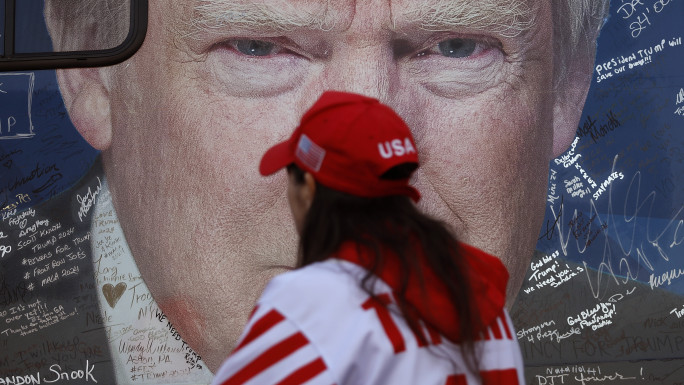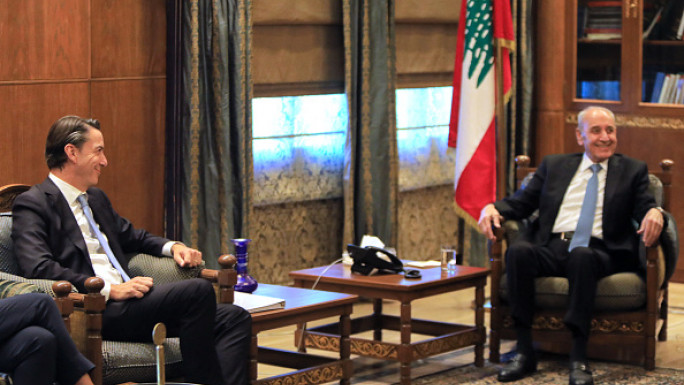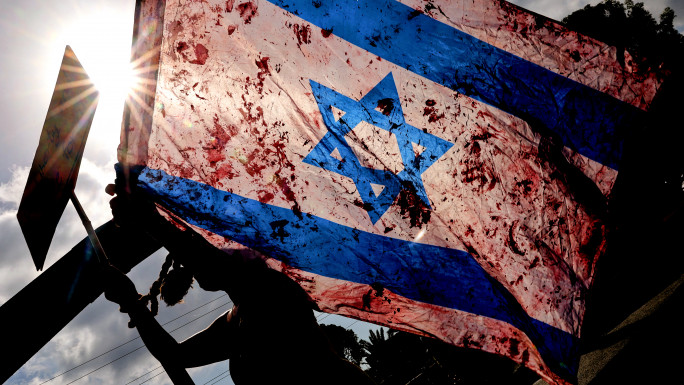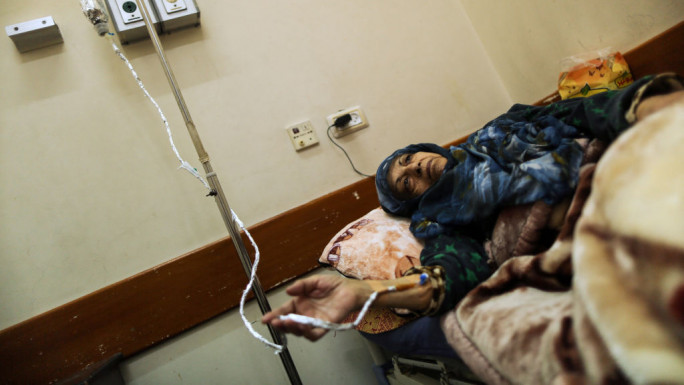
Palestinians are winning the online battle for Jerusalem
Popular demonstrations took place from Morocco to Indonesia amid a shy reaction from politicians in many Arab countries.
As protests have continued in Gaza and the West Bank for two weeks now, with reports of homemade projectiles fired from Gaza without any Palestinian faction claiming responsibility, disproportionate force has been used by Israeli occupation forces. Shocking scenes have emerged of Palestinian children arrested, handcuffed and blindfolded, as in the case of the teenager Fawzi al-Junadi who was photographed surrounded by 22 heavily armed Israeli soldiers in the occupied West Bank city of Hebron.
The iconic picture of Fawzi went viral, and has become a symbol of the Jerusalem protests, with international artists and cartoonists representing him in their work.
On 16 December, the picture of 29-year-old wheelchair-bound Palestinian Ibrahim Abu Thuraya also went viral, after an Israeli sniper shot to the head killed him in eastern Gaza near the border fence with Israel.
Abu Thurayya, who had previously lost both of his legs and vision in one eye due to an Israeli air strike during the all-out war on Gaza in 2008, was last seen crawling on his hands through smoke-filled grassland near the fence, attempting to hang a Palestinian flag.
Less than 24 hours after publication, a video interview with Abu Thurayya filmed two days before his killing had already been viewed 31,000 times and shared over 72,000 times.
Social media platforms such as Facebook, Twitter and YouTube are powerful tools in the hands of Palestinians and have changed the way events are covered in Palestine. Thanks to this technology, Palestinians are making their voices heard, highlighting the utter suffering, atrocities, frustration and humiliation under years of Israeli military occupation in the occupied West Bank, East Jerusalem and besieged Gaza.
 |
Live footage has been broadcast in an unedited, uncensored way, conveying their message and making their voices heard |  |
Muthanna al-Najjar, the local Palestinian photojournalist who filmed the short video interview with Abu Thurayya and shared it on his Facebook page, said that his account was targeted repeatedly by hackers soon after he posted the clip.
Despite this, he has been overwhelmed with how widely his video has been shared across international news outlets, stressing that social media is a great tool. Without it, he knows his video would not have reached tens of thousands of Facebook users, and western audiences around the world.
"The phenomenon of citizen journalists has increased in recent years across Palestine, especially in Gaza which is often the target of air, sea and ground attacks. The reason for this is an awareness of the powerful role social media can play in drawing the attention of the international community to our plight, especially as there is training offered by media centres and educational institutions providing advice to users on the importance of being credible, using the correct terminology, posting accurate genuine breaking news", he said.
Tensions have risen with almost daily peaceful demonstrations since Trump's announcement to officially recognise Jerusalem as Israel's capital, and move the US Embassy from Tel Aviv to Jerusalem.
Palestinians' frustration pushed them to take to Twitter, using many hashtags in both English and Arabic such as #HandsOffJerusalem, #Jerusalem, #FreePalestine, #SaveAlQuds and #JerusalemIsTheCapitalOfPalestine.
Many emphasised that Jerusalem is a city that was occupied in 1967, and urged Arabs, Muslims and pro-justice supporters to take action.
 |
The iconic picture of Fawzi went viral, and has become a symbol of the Jerusalem protests |  |
Palestinian activists and citizen journalists have taken the lead, finding solace in social media, which has allowed them to express their frustration. Live footage has been broadcast in an unedited, uncensored way, conveying their message and making their voices heard.
Twitter Post
|
Professor Kamel Hawwash, a British Palestinian academic based at the University of Birmingham says that new media platforms have a role to play to show the world what is happening on the ground. "Social media allows people to share news, disseminate photos and videos which reflect daily life under occupation, all you need is a smartphone with internet data", he said.
In a televised interview with Maan TV, Palestinian journalist and analyst Nasser al-Lahham, the director of Maan News Agency in Palestine described what is happing as a revolution against American imperialism, colonialism, Israeli settlers and oppression against the Palestinian people who fight for freedom.
"We must not underestimate the power of pictures and footage emerging from inside the occupied territories and from around the world. The forms of resistance have evolved in light of social media compared to 17 years ago before the rise of the internet."
Palestinians are winning the online battle, and Israel cannot prevent the spread of harrowing images of Israeli injustices against Palestinians, some of which have become iconic symbols of resilience and defiance.
While Israel's ban on 3G technologies for the only two Palestinian telecommunications and mobile companies has caused problems, some Palestinian journalists and social media activists use Israeli Orange sim cards - a much faster network - in order to be able to live-stream, post and share content in real time.
Palestinian-British academic and author Ghada Karmi has said that "there is no question that social media has an important role, it is the best medium and primary source of information that people use, as Palestinians are often under the influence of the Israeli narrative that is trying to suppress the Palestinian side of the story".
In recent years, Israeli authorities have been monitoring the Facebook accounts of Palestinians, arresting hundreds across the West Bank and East Jerusalem with Palestinian citizens of Israel accusing them of inciting violence.
While Palestinians consider their posts an essential expression of their frustration, Israeli authorities often class these posts, including those with songs, as a crime punishable under Israeli law. The authorities are imposing a form of digital crackdown, a practice which hampers the freedom of expression.
 |
Israeli authorities often class these posts, including those with songs, as a crime punishable under Israeli law |  |
This idea is echoed by Issa Amro, a Palestinian human rights defender and activist from the occupied West Bank city of Hebron, who has been sharing footage.
"Live streaming enables social media activists to disseminate material as a news source for the western audience in light of the biased western media outlets, to present their side of the story. Israel is afraid of the power of social media and uses a law criminalising activists who rely on this effective tool for challenging the Israeli propaganda machine."
The online battle to report events on the ground continues, as citizen journalists find innovative ways to distribute material. While the Jerusalem protests have been a good example, it is not the first time, and will not be the last, that such techniques are used.
Read more: Palestine. It's about injustice, not religion
During the three Israeli devastating wars on Gaza in late 2008, 2012 and mid-2014, Palestinian social media activists won the cyber war by countering the mainstream narrative of their besieged territory. Despite a suffocating physical and digital blockade imposed in 2007, they have reached vast numbers of people around the world.
Khalid Safi, a Palestinian blogger and social media consultant told The New Arab that in light of biased western media coverage, Palestinian citizen journalists have been able to change the public perception of Palestine in the West through the online awareness activities.
"The unedited and unfiltered information disseminated by citizen journalists has definitely weakened the Israeli narrative, as Palestinians are able to connect directly with overseas audiences and tell their stories, unlike the content of big corporations that has to be filtered through a western agenda, and I can tell you that those online activists won't be intimated by the ongoing practices of the Israeli military through the systematic arrest campaign."
Yousef Alhelou is a Palestinian journalist and political analyst from Gaza, based in London. He is a United Nations fellow and alumni, and served as a Reuters journalist fellow at the University of Oxford.
Follow him on Twitter: @YousefAlhelou
Opinions expressed in this article remain those of the author and do not necessarily represent those of The New Arab, its editorial board or staff.





 Follow the Middle East's top stories in English at The New Arab on Google News
Follow the Middle East's top stories in English at The New Arab on Google News


